The city of Kano stands surrounded by 700-year-old mud-baked walls, constructed to deter foreign attackers. Yet the walls, completed in the 14th century to protect the people living in one of West Africa’s oldest commercial hubs – now Nigeria’s second largest city – couldn’t protect them from Boko Haram.
Boko Haram is the latest extremist group in town; Nigeria has seen many in its troubled past. In 2014, the city’s emir – the second most important Islamic leader in the country – asked citizens to “acquire what they need” to defend themselves against Boko Haram fighters.
In the following week, more than 100 people gathered at the city’s central mosque for Friday prayers would die in attacks.
The extremist group, which formed in 2002 in Nigeria’s northeastern city of Maiduguri and initially operated in the areas around it, had come south and westward, to places like Kano, where the attackers had hit several times earlier in the year.
That July, reportedly under instruction from Boko Haram, girls and women detonated suicide bombs across the city, carrying out four attacks during the week of Eid.
Two girls – one looked to be 11, the other maybe 18 – stepped out of a minibus and walked to a mobile phone market. The blast killed a reported 15 people. A girl believed to be 13 detonated a bomb outside a mosque. Another set off an improvised explosive on a college campus.
In a neighbouring state, security agents arrested a 10-year-old girl with bombs strapped to her chest.
Thursday afternoon that same week, I gathered with colleagues around a petrol station that had just been cordoned off with yellow tape. People stood on the curb watching uniformed men strut around. In answer to our questions, officials and witnesses told us a woman had asked an attendant for kerosene just before she blew herself up. It was the second bomb blast at a petrol station in Kano in less than five days.
Four years later and the attacks haven’t stopped. Some schools remain closed, families are still displaced, and farmers are afraid to work in their fields – so hunger grows.
My driver pointed to a spot on the ground, just past the shadow of the station’s canopy. A hand lay there, like a prop from a Halloween horror flick. It was her hand, with swollen flies creeping across the palm. Her five fingers, intact, were frozen in a gentle curve.
The rest of her body was strewn in pieces around the gas pumps. My colleagues had turned away from the hand, shaking their heads. I kept looking at it, trying to attach it to someone: a name, a face, a story, a place, a birth, a family. That hand had been attached to a person. Why that person had decided to carry and detonate a suicide bomb, I will never know.
After filing that story and dozens of others on Boko Haram for news outlets around the world since 2012, I still don’t know exactly what Boko Haram wants. For the past six years, I’ve been following the group’s trail, attack after attack.
Read more → Unmaking Nigeria's Boko Haram
In 2015, President Muhammadu Buhari said Nigeria had “technically” won the war against Boko Haram.
Yet, here we are, four years later and the attacks haven’t stopped. Some schools remain closed, families are still displaced, and farmers are afraid to work in their fields – so hunger grows.
Last month, insurgents hit two villages in Borno State.
This month, days before the initial 16 February date of the presidential election, the so-called Islamic State-affiliated faction of Boko Haram, known as ISWAP, attacked the Borno State governor’s motorcade.
When the group opened fire in a community near Maiduguri, the Borno State capital, on the morning of the scheduled election, the Nigerian army said Boko Haram was trying to disrupt the vote. Voters eventually went to the polls on 23 February. Buhari won the vote, ahead of his main challenger, Atiku Abubakar.
“Boko Haram is everywhere”
Jamā'at Ahl as-Sunnah lid-Da'wah wa'l-Jihād, People Committed to the Teachings of the Prophet and Holy War, evolved into Boko Haram, a terrorist group sanctioned by the US government.
The group began about 17 years ago as an ultra-conservative, Salafist organisation that wanted to protect what it felt was under threat: Islam. The members wanted to live in a society guided by a fundamentalist form of Islam rather than under Nigeria’s Western-influenced democratic government. In 2009, after the founder, Mohammed Yusuf, was killed while in the custody of state security agents, the members went underground to strategise and recruit. They quickly came back up to wage war on the Nigerian government.
In the past decade, Boko Haram-related deaths have risen: 7,000, …10,000, …15,000, …20,000. The Washington, DC-based think tank Council on Foreign Relations calculated that as of 2018 more than 37,000 people had been killed, including civilians, government forces, and alleged Boko Haram fighters.
Even when Boko Haram fighters are not visible, the group’s presence is felt. People rearrange their lives to stay alive, to stay out of the insurgents’ path.
A few months ago, I was travelling by road from southern Borno north to Maiduguri. The daily military convoy that escorted me and hundreds of civilian commuters sped past villages abandoned after attacks, and the drivers in the cars alongside me kept up, swerving past freshly dug trenches and spiky tumbleweed.
No one wanted to be left behind.
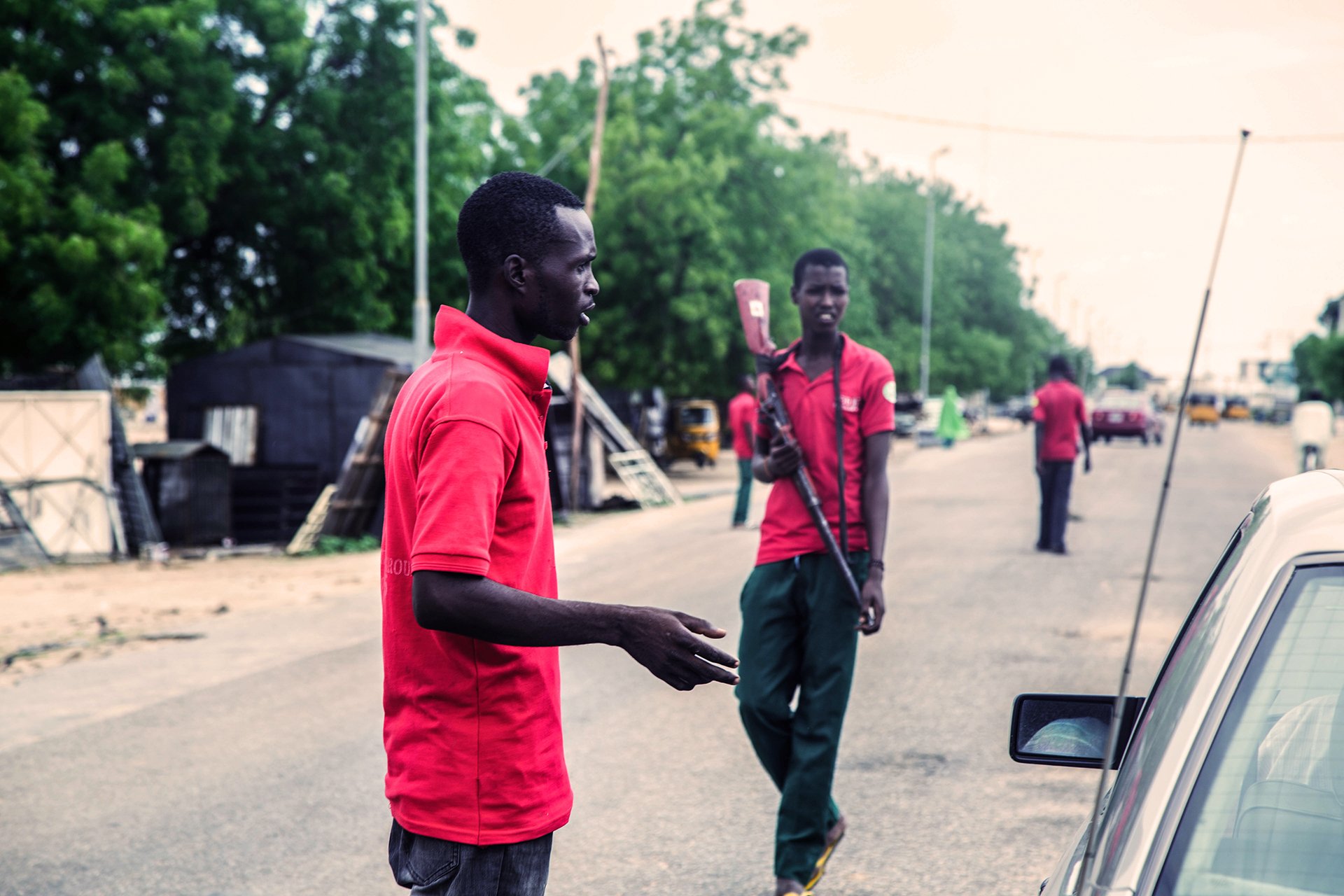
“Boko Haram is everywhere,” Jamilah*, a peace negotiator who is both hailed and feared for her close relationship with Boko Haram, told me in September. A mother of three, Jamilah knew Mohammed Yusuf and his followers years before they turned to violence and she’s garnered what seems to me to be an unbreakable bond of trust with Boko Haram. These days, she finds ways to send money and food to their camps in the bushes. Without her, the insurgents often refuse to talk peace with the Nigerian government.
We were driving through Maiduguri to a field where hundreds of families from attacked villages had set up straw tents. She told me the group’s roots are now so deeply planted in local communities throughout northeastern Nigeria that dislodging them is nearly impossible.
She pointed to the clusters of clay-walled, zinc-roofed homes along the road, signalling those where she said Boko Haram sympathisers live: here and here and here. “Everywhere.”
A network of sympathisers and informants in Maiduguri keep Boko Haram in action. Tuk-tuk drivers in the city are perfectly positioned to supply the extremists with information, an undercover security agent once told me.
Jamilah knows some of those who do. They drive their tuk-tuks near her and give her a slight nod as a gesture of respect for her relationship with Boko Haram.
On my computer I have a picture of a few dozen boys standing in a walled-in compound. Some wear flip-flops, others are barefoot. Their heads covered in turbans, they stand in military formation, clenching AK-47 rifles. Boko Haram supposedly released it on Twitter in 2015, taken at a militant training camp said to be in or near Cameroon.
Every now and then, I pull up that photo to remind myself that Boko Haram isn’t going away any time soon; none of the boys in the photo look older than 14.
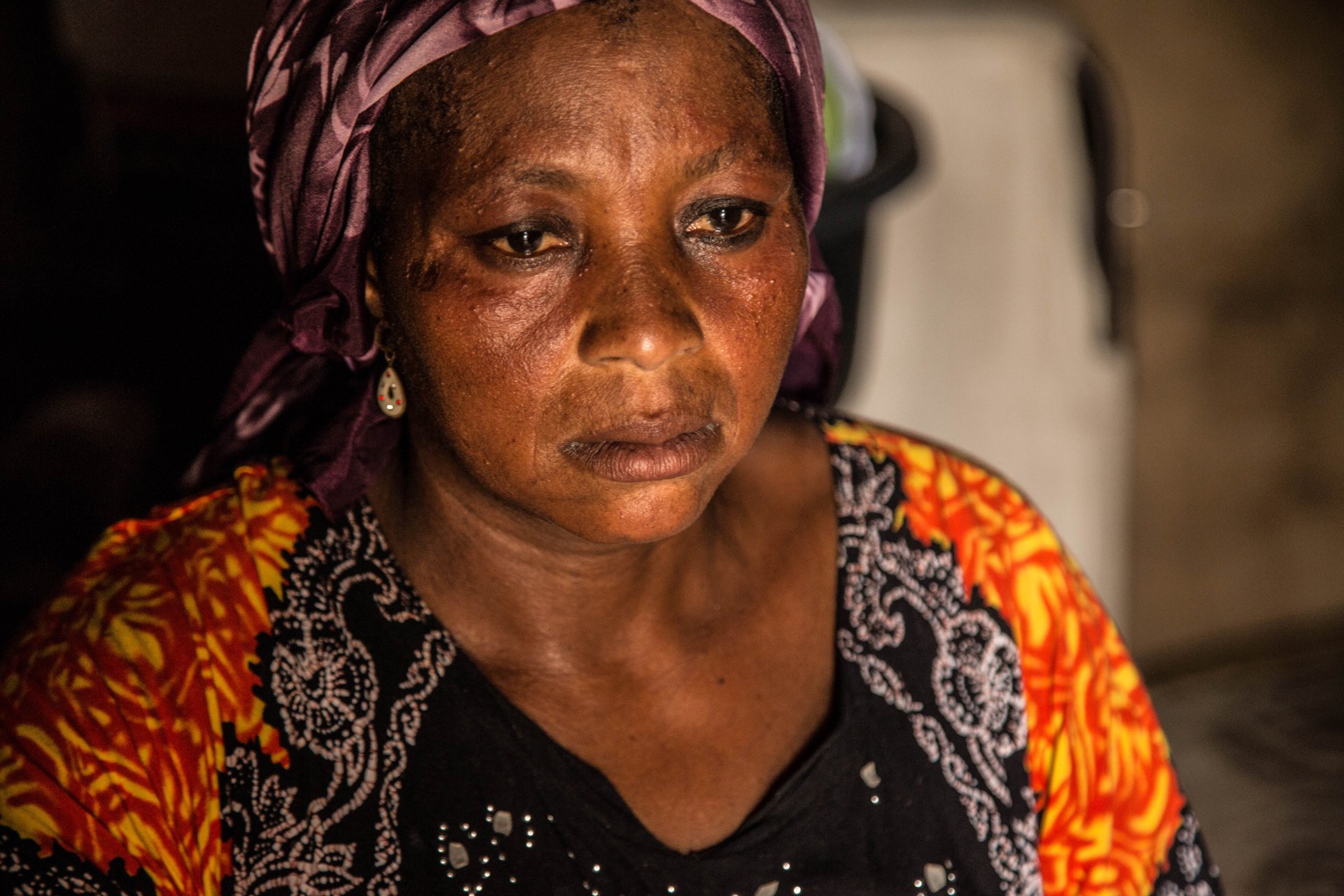
I think about that, too, when I remember Rebecca Sharibu, who is still waiting for her daughter Leah to come back after she was kidnapped last year from her school in Dapchi. And when I think of Rebecca Gadzama, an activist who is rebuilding the school in her hometown of Lassa, in southern Borno State, which Boko Haram fighters pass through on their way to carry out attacks in other parts of the state. Or Abba Aji Kalli, the Borno State commander of the Civilian Joint Task Force, or CJTF, a volunteer group that provides intelligence to the military and hands over suspected Boko Haram members.
“A downfall for Nigeria”
I started hearing about Boko Haram in 2011 when I lived in New York, where I worked for an online media outlet. We’d get text and email messages from people in Nigeria who had just witnessed, escaped from, or heard about a Boko Haram attack. Those tips always flickered my attention, but the spark never lasted long. The attacks were too far away for me to comprehend.
Moving to Nigeria in 2012 forced me to pay attention.
In the first weeks of September 2014, I monitored Boko Haram’s expansion. As the showers of the rainy season began to dwindle, towns in the northern nook of Nigeria’s Adamawa State, more than 700 kilometres southeast from Kano, fell one by one.
In a place called Gulak, fields baked under the sun. Most farmers and townsfolk had run up to the mountains to hide after Boko Haram had moved in. But even before the group had raised their flag, the community had been on edge after a series of hit-and-run attacks in the months leading up to the takeover of their city.
That July, I had spoken to a woman we’ll call Fatima*. Boko Haram fighters had sliced off her husband’s head in front of her, she told me. Her voice sounded like a dried leaf being crushed underfoot, thin and brittle.
Beneath her hijab, her eyes looked fearful. The fighters had been there again not too long ago. She couldn’t walk beyond her front door, she was that afraid.
After the capture of the lowlands, Boko Haram went into the highlands.
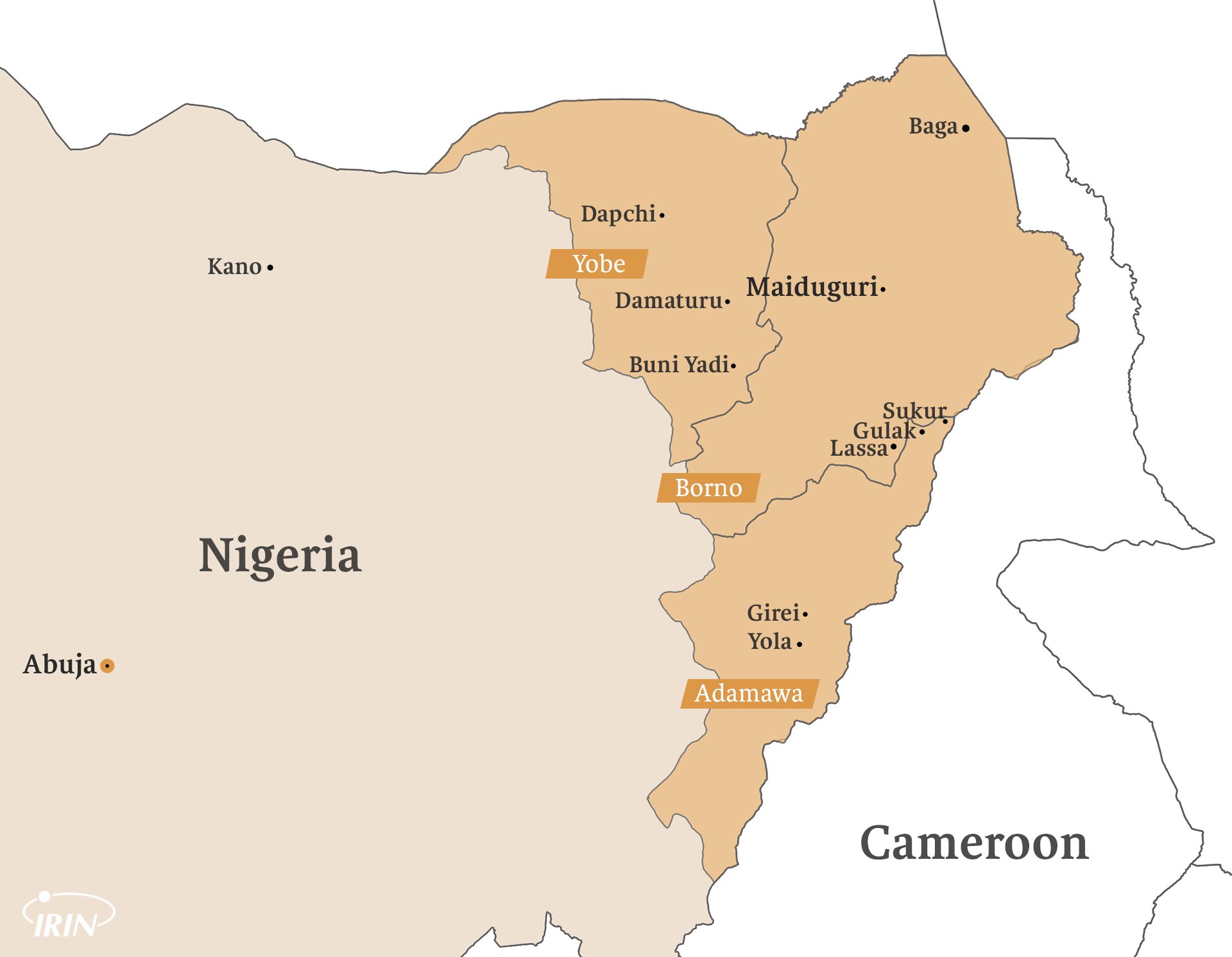
In December 2014, more than 100 militants climbed up the mountains, from one terrace to the next, and entered the historic kingdom of Sukur. They slaughtered men, snatched women and girls, stole food and animals. Wooden houses collapsed under fires.
In 2017, I travelled to Sukur, after the Nigerian army had reclaimed the area. The people of Sukur Kingdom, Africa’s first cultural landscape to be declared a UNESCO World Heritage site, were trying to rebuild.
Quaint stone-paved walkways led to homes with toppled roofs; 500-year-old artifacts had been set ablaze.
When Boko Haram came, they came with a mission to destroy us and erase our culture, the kingdom’s political and spiritual leader, Luka Gizik, told me. He pointed to the gaping holes in his palace walls – walls made of flattened rocks stacked mortar-less on top of each other generations ago and prized for their architectural ingenuity. He sighed deeply.
Down below, the winding trail of Boko Haram’s devastation led to sprawling, overcrowded settlements that started springing up in 2013.
Camps for the two million people uprooted from their homes, intended to support them for one or two years, have turned into semi-permanent communities with chiefs, classrooms, yearly budgets, clinics, and security forces. Some are government-sanctioned, others were set up by people who needed a place to sleep, eat, and let their children play in peace.
After Boko Haram captured Gulak, and attacked Sukur and nearby areas, people who had lived in the mountains either ran east into Cameroon or headed more than 250 kilometres south, towards the Adamawa State capital of Yola.
Some squeezed into a camp in Girei, 45 minutes north of Yola. When I visited in the first few weeks of 2015, camp officials were registering at least 100 people a day, just three weeks after opening. More than 4,000 people lived there.
Organisations providing food and other aid included: the Nigerian National and State Emergency Management Agency; the Federation of Muslim Women of Nigeria; the Nigerian Red Cross; Oxfam; the Nigerian umbrella body of Muslim groups Jama’atu Nasril Islam; and the International Rescue Committee.
Still, there was never enough.
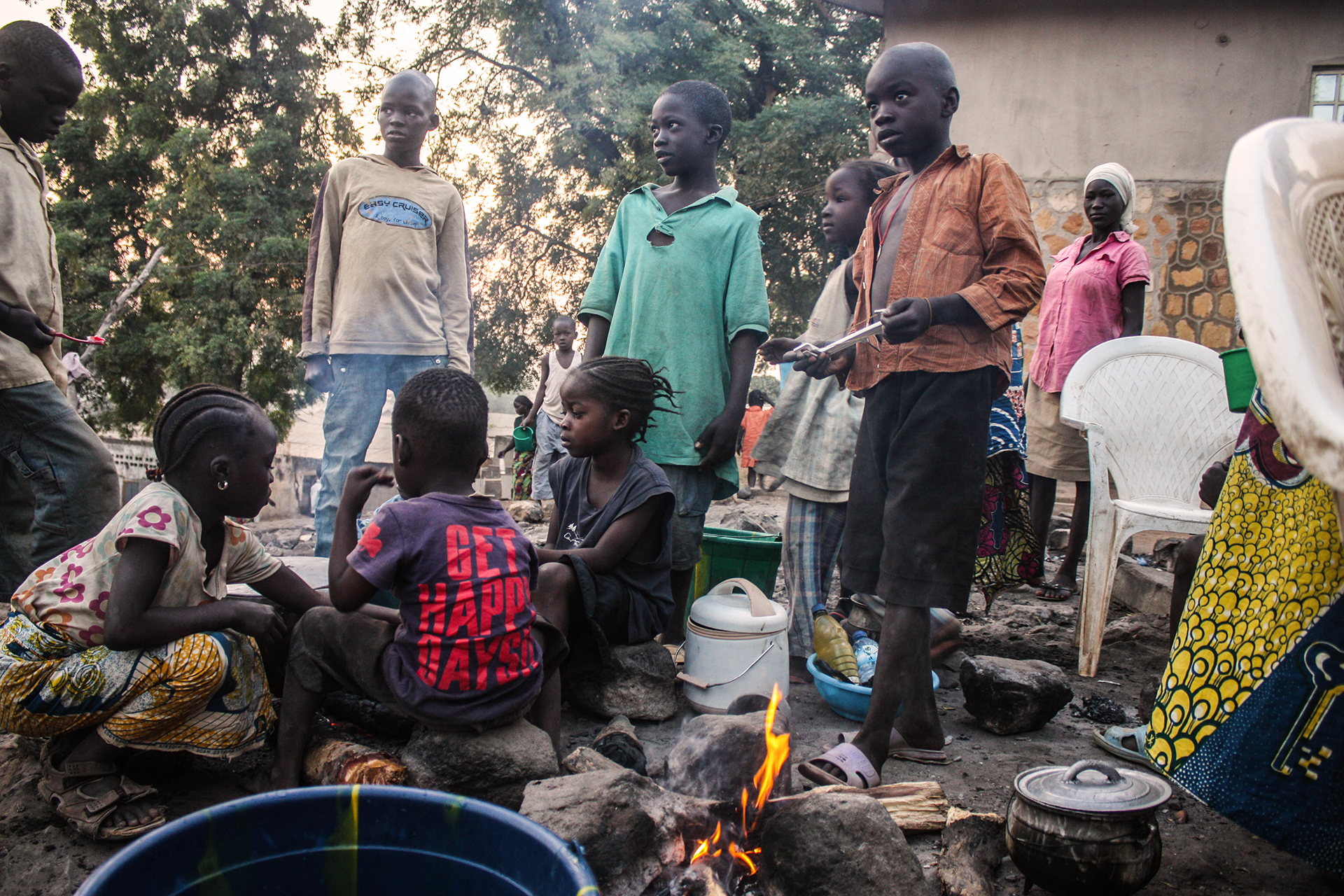
In fact, thousands of people were dying in northeastern Nigeria’s IDP camps, succumbing to starvation, malnutrition, and disease.
In Girei, residents told me their “how-I-escaped” stories and cursed Boko Haram under their breath, refusing to utter their curses out loud. The men said they had never seen anything like Boko Haram, a throng of “demons” – as they described them – bent on wreaking havoc on everything in their path: Christians, Muslims, and everyone in between.
An elderly, bearded man sat next to his wife Sarah, who bore a child in her old-age, like Sarah in the Bible. He set his Bible on his lap and showed me the gash on his legs where, he said, a Boko Haram fighter had slashed him with a machete. The men had killed their little girl.
Across the yard, hundreds of children played in water, stomping and giggling when it sprayed in the air. I sat and watched them. Then I asked about their parents.
Eight-year-old Jummai’s parents were dead. Her grandmother had brought her to the camp. Thirteen-year-old Fatimatu and her younger sister said they were fetching water when Boko Haram fighters drove into their village on motorbikes and killed their father. With their mother already gone, they were now orphans, like five-year-old Moses. The fighters had killed his mother, and when his father tried to bury her body, the fighters killed him, too. Rose, 25, was taking care of her 28-day-old nephew Ibrahim, also orphaned.
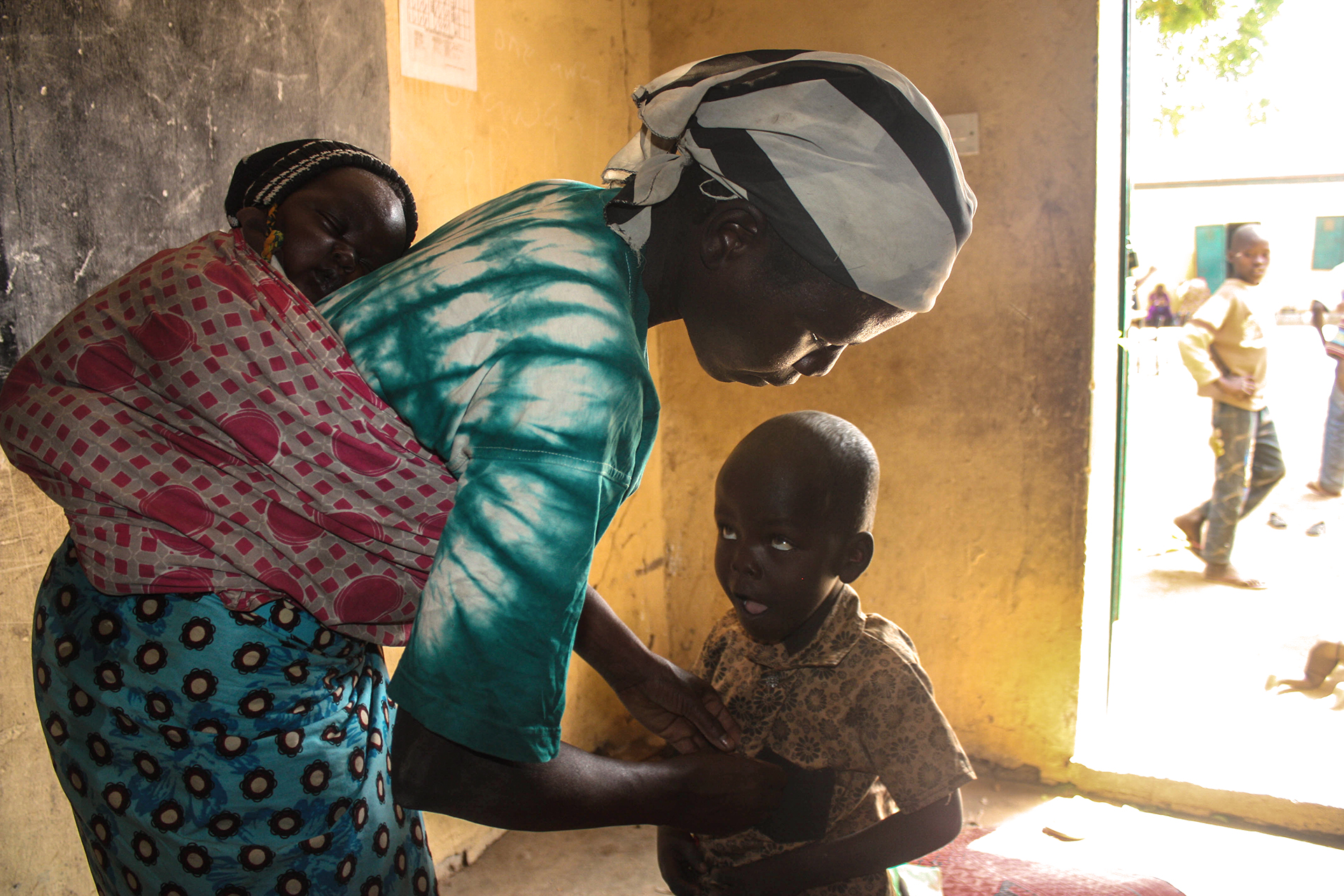
A camp healthcare worker, Ahmed, told me: “It’s a downfall for Nigeria… these kids are losing their parents, and the president of Nigeria has not come here to console these orphans.”
At the time, Goodluck Jonathan was in the middle of a fierce campaign, trying to keep his seat as president. Months before the general election, he had just made his first trip to the northeastern region since 2013, telling the displaced he cared about their plight.
A week before the president’s visit, Boko Haram had razed the town of Baga, near Lake Chad, for four days – an attack so horrendous it even made international news headlines.
Read more → Nigerian lives matter - the Baga controversy
“Boko Haram is still a threat to schools”
Before Boko Haram began waging war on the Nigerian government, in 2007, eight million of the country’s primary school-aged children were not being educated. By 2015, in the thick of the insurgency, more than 10.5 million school-aged children weren’t in school, the majority in the north of the country. Today, that number has swelled to more than 13 million.
Boko Haram members have disowned the phrase Boko Haram – coined by the media and Maiduguri residents because of the founder’s aversion to Western civilisation. They say the phrase, which can be understood to mean ‘Western education is sinful’, does not accurately capture their views. The group targets schools modelled on the Western-style, where subjects like art and literature are taught, secular views trump religious biases, and boys and girls sit in the same classroom.
More than 1,000 schools have been severely damaged or destroyed, 19,000 teachers displaced, and 2,300 teachers killed since the start of the insurgency in 2009, according to UNESCO and Human Rights Watch.
Following this strand of Boko Haram’s trail in March 2014, I drove through Buni Yadi town in Yobe State to visit a school that had been attacked a month before. When I got there, none of the townspeople wanted to accompany me to the school.
It’s the scrap of a chequered shirt, wound around a shard of window glass and blowing in the wind, that I’ll never forget.
The corpses had long been removed, but the blackened walls and empty bunk beds were still there. The stench of smoke lingered. Boko Haram fighters had overrun the boys’ school before sunrise, shooting, looting, and setting things ablaze. Fifty-nine boys died. Almost two dozen buildings were destroyed.
The boys had been sleeping when the attack came. Some suffocated. Some ran out, with at least one tearing his shirt in the process. Parents later told me that among their dead sons were aspiring doctors, engineers, lawyers, and teachers.
After the Buni Yadi attack, the federal government shut down five high schools in the northeast. Government-provided security was supposed to have been boosted under the state of emergency protocol, but that plan had failed.
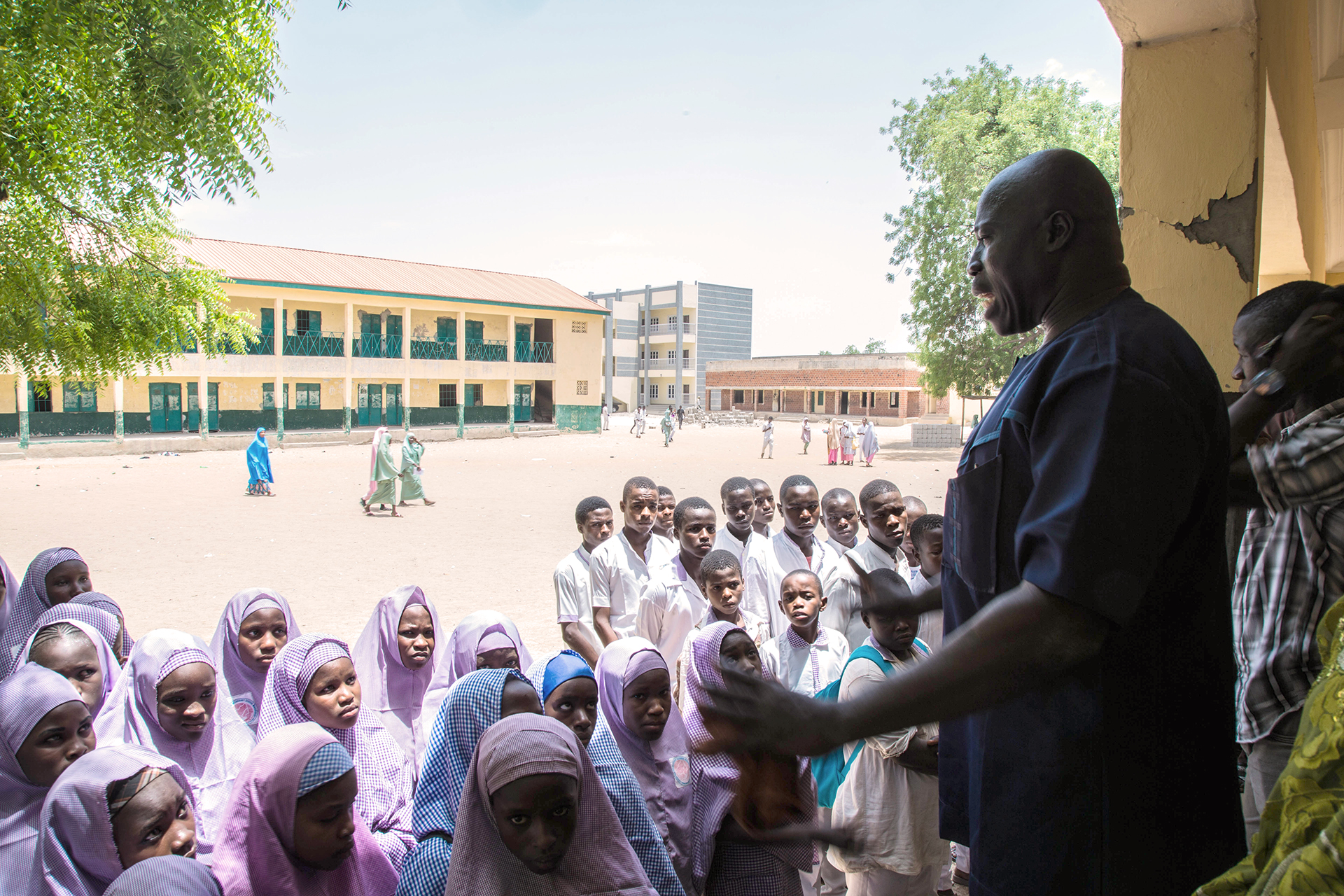
"It is unfortunate [that], up until now, they have not done anything for us in terms of providing some security measures to be taken in our schools,” Yobe State Education Commissioner Mohammed Lamin told me when I stopped by his office to see him again last year. He said the state was doing what it could to meet the federal government’s shortcomings.
"Maybe they may come in the near future to start fencing some of the schools or providing some security equipment to us, but up until this moment nothing has been done. It is only the state government that has been providing all these things to our schools."
Five years after the massacre, the Buni Yadi school is still closed. Reconstruction, managed by the federal government, started last year.
Though the other schools in Borno State that were closed after the 2014 attack were reopened two years later, a high school principal told me last April: “Boko Haram is still a threat to schools in Maiduguri”. Five teachers had fled the school he heads.
Fear and hunger
Last year, I was able to get my hands on a couple of books that I’d been looking for: religious texts that Boko Haram uses. A vendor in the market was selling them for cheap. One, written by an Egyptian scholar, prescribes the harshest punishments for societal corruption and advocates for a violent jihad to protect “true Muslims”.
With Boko Haram-approved texts readily available in the market, I wondered, how could the army ever defeat the militants?
“This is the book they use,” Mustafa* told me. Mustafa, who had worked as an informer on Boko Haram for the government, and I spoke from time to time. He had spotted the books in a market and got them for me.
Mustafa knew very well the religious books that Boko Haram members preferred. He’d once infiltrated the group, and the books he’d seen at the market, he said, were the same ones the insurgents read in the camps they lived in.
With Boko Haram-approved texts readily available in the market, I wondered, how could the army ever defeat the militants?
Finding those books drove home what the government won’t acknowledge: In many parts of northeastern Nigeria, even when you can’t see Boko Haram, their presence is felt. The fear is not going away.
Fear has kept many farming and fishing families away from their land and their boats – contributing to a food shortage in the northeast. During the rise of Boko Haram, 90 percent of agricultural production was wiped out.
Read more → Our in-depth coverage of Boko Haram
With food production at dismal levels in northeastern Nigeria, humanitarian groups stepped in. The UN’s Food and Agricultural Organisation began distributing fertiliser, seeds, and water.
Within a year, the number of people facing acute food insecurity in the states hardest hit by Boko Haram – Yobe, Borno, and Adamawa – fell from 4.7 million in 2017 to 2.3 million in 2018.
But today food insecurity is high again.
Since November, attacks by Boko Haram have increased, disrupting food production during dry season – when food stocks are traditionally low – and also blocking access for humanitarian aid to be delivered.
And this was after Kashim Shettima, the governor of Borno State, had taken measures to revitalise agriculture.
In many parts of northeastern Nigeria, even when you can’t see Boko Haram, their presence is felt. The fear is not going away.
A specialist in agricultural economics, he distributed 270 tractors to farmers in June, hoping this would encourage them to return to their fields. They did. But after 12 farmers were killed by Boko Haram fighters while working their land on a single Saturday in October, the fields are again empty.
Early this year, Governor Shettima wept when he met the Nigerian president in Abuja to discuss the upsurge in attacks.
His tears said everything: Boko Haram is back and fighting.
They never really left, though, despite the government’s repeated claims to have defeated the extremist group. In December, the insurgents overran a military base, taking ammunition, rocket launchers, and vehicles.
In the northeast, when I’m on the streets of places like Yola, Damaturu, or Maiduguri, I hear people ruminating over conspiracy theories that blame Western multinational organisations for creating Boko Haram or local politicians for funding it.
Whether those rumours have any nuggets of truth in them or not, it’s clear that the business of conflict has blessed some and devastated others. In Maiduguri, where it all began, government officials and wealthy businessmen are building expensive mosques and commercial plazas all over the city. The price of real estate has spiked.
At the same time, many of the nearly two million Nigerians displaced by the insurgency still aren’t getting food.
Earlier this month, frustrated IDPs marched out into the streets of Maiduguri. They said they’d been hungry for days and that the government had neglected them. In fits of rage, women and children knocked down political campaign posters.
When the police came out to spray tear gas on them, they scattered.
(*Name changed to protect identity of source for security reasons)
co/js/si/ag




